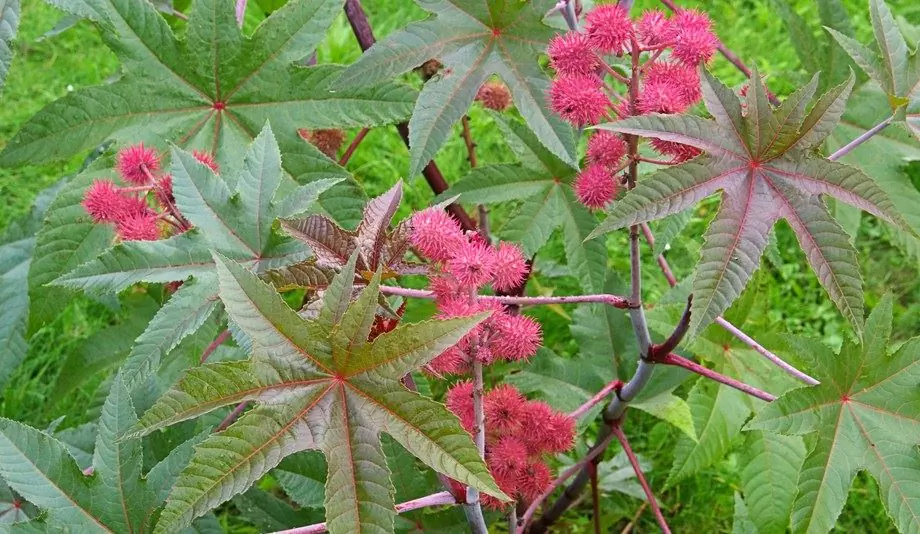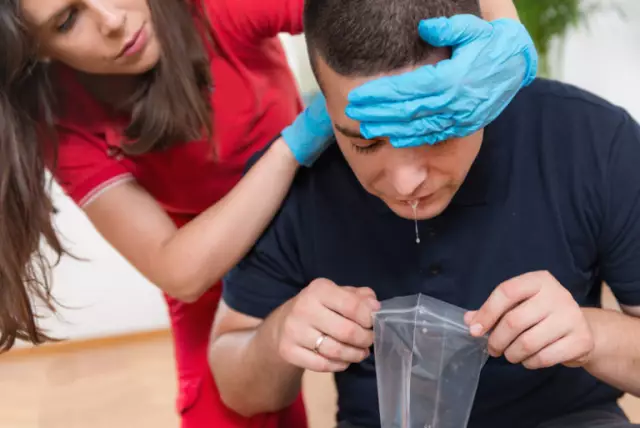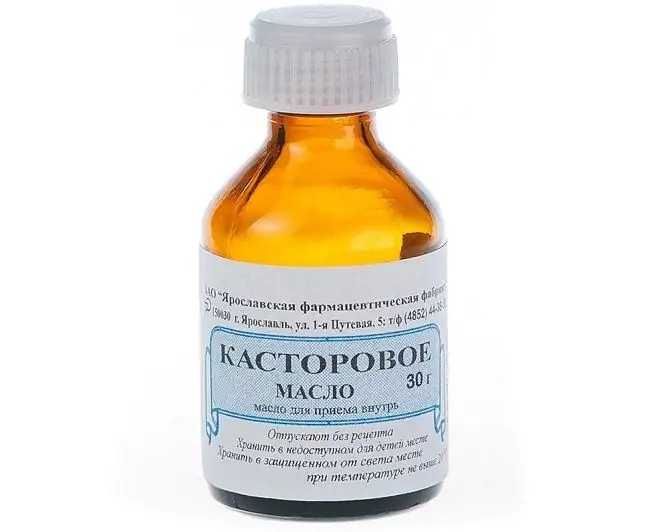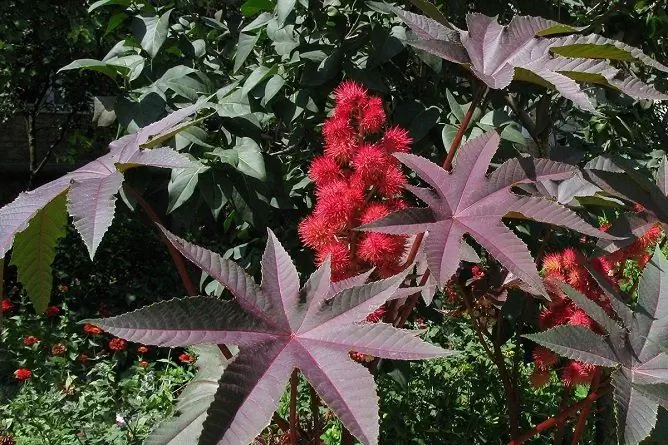- Author Rachel Wainwright [email protected].
- Public 2023-12-15 07:39.
- Last modified 2025-11-02 20:14.
Castor bean poisoning
Castor oil plant is an ornamental, fast-growing annual plant of the Euphorbiaceae family with medicinal properties. Large curly star-shaped leaves and fruits in the form of boxes give the plant decorativeness. Castor bean seeds of bright color and peculiar shape, reminiscent of the outlines of a tick, hence the name of the plant.

Source: depositphotos.com
It is in the seeds that are used to obtain castor oil (castor oil) that the most toxic protein is ricin. Ricin is 6 more toxic than potassium cyanide, when it enters the human or animal body, irreversible disorders develop quickly, therefore castor oil plant is considered the most poisonous seed plant.
In addition to ricin, which is mainly found in seeds (castor beans), castor oil also contains the alkaloid ricinin. Ricinin is present in all parts of the plant, it is toxic, but less than ricin.
How is castor oil poisoning?
Ricin has a cytotoxic effect, that is, it acts directly on the cells of the body, stopping protein synthesis in them. Under these conditions, the cell starts the apoptosis mechanism (the process of cellular self-destruction).
Castor oil can be poisoned by eating the seeds of the plant. For an adult, a lethal dose of the toxin is contained in 10-20 castor beans, fatal poisoning in a child is possible with the use of 5-6 seeds.
When ricin enters the gastrointestinal tract, it causes damage to the inner membranes of the stomach and intestines, then, being absorbed into the blood, leads to circulatory disorders, and also causes the death of liver cells, spleen and renal epithelium.
A respiratory route of poisoning through inhalation of castor bean pollen is theoretically possible, but there are no confirmed data on such episodes.
When castor oil juice gets on the skin, intoxication does not occur.
Pets can be poisoned by eating castor bean. The meat of such animals can be eaten, provided that the blood is carefully drained and the internal organs are discarded. If this is not done, the meat of a poisoned castor-bean animal can cause human poisoning.
Poisoning symptoms
After eating castor beans, the incubation period lasts about 24 hours (very rarely - several days). The disease begins with manifestations of acute hemorrhagic gastroenteritis:
- nausea, vomiting (often with traces of fresh blood or "coffee grounds");
- sharp pain in the abdomen;
- diarrhea (stool may turn black);
- possible bleeding from the anus.
Later, a sharp weakness, cyanosis join, blood pressure drops, the pulse quickens, becomes weak, threadlike. The victim is drowsy, apathetic, hardly accessible to contact, poorly oriented in space and time, he may have convulsions, confusion.
Signs of general intoxication are characteristic: the patient complains of intense thirst, dry mouth, intense headache.
In severe poisoning, kidney function is blocked, anuria develops - there is no urine output at all. Death can occur as a result of vascular collapse, shock on days 6-8.
Ricin has a characteristic effect on red blood cells. Erythrocytes stick together (agglutination of erythrocytes), forming small thrombus-like structures. Blocking the vessels of the capillary bed, the glued erythrocytes impede the normal blood supply to organs and tissues, disrupting trophic and metabolic processes in them.
Considering that ricin is a capillarotoxic poison, in aggregate, these disorders lead to massive ulceration of the mucous membranes of internal organs, necrosis of lymph nodes, damage to internal glands, destruction of tissues of parenchymal organs.
In addition, the adhered erythrocytes cannot perform the function of gas exchange in full, causing oxygen starvation of the body.

Source: depositphotos.com
First aid for castor oil poisoning
If you suspect castor oil poisoning, you must immediately call an ambulance, and only then proceed with the provision of first aid.
First aid is symptomatic:
- perform gastric lavage (drink 1-1.5 liters of warm water or a weak solution of potassium permanganate and induce a gag reflex by pressing on the root of the tongue);
- take a laxative (Magnesium sulfate, Bisacodyl, Glycerol);
- take enterosorbent (Enterosgel, Polysorb, activated carbon);
- take an enveloping drug (Almagel, Fosfolugel).
When is medical attention required?
If the poisoning occurs as a result of the use of castor bean fruits, medical attention is always needed, even when the poisoning seems mild, since it is impossible to assess its severity at home. Since there is no antidote, treatment is symptomatic, and powerful detoxification and supportive therapy is performed. In the first few days, the patient is under 24-hour medical supervision.
Possible consequences
With timely assistance, mortality due to poisoning with castor bean seeds is approximately 2%, in the absence of qualified assistance it reaches 6-7%.
However, even with a successful outcome, the complete restoration of the functions of the affected organs does not occur, which is fraught with the development of various pathologies in the future.
Prevention
To prevent poisoning with castor beans, it is necessary to abandon the use of castor bean as an ornamental plant if the family has children who have direct access to garden plantings.
It is necessary to carry out explanatory work with children, explaining to them the degree of threat when eating castor bean seeds.
YouTube video related to the article:

Olesya Smolnyakova Therapy, clinical pharmacology and pharmacotherapy About the author
Education: higher, 2004 (GOU VPO "Kursk State Medical University"), specialty "General Medicine", qualification "Doctor". 2008-2012 - Postgraduate student of the Department of Clinical Pharmacology, KSMU, Candidate of Medical Sciences (2013, specialty "Pharmacology, Clinical Pharmacology"). 2014-2015 - professional retraining, specialty "Management in education", FSBEI HPE "KSU".
The information is generalized and provided for informational purposes only. At the first sign of illness, see your doctor. Self-medication is hazardous to health!






